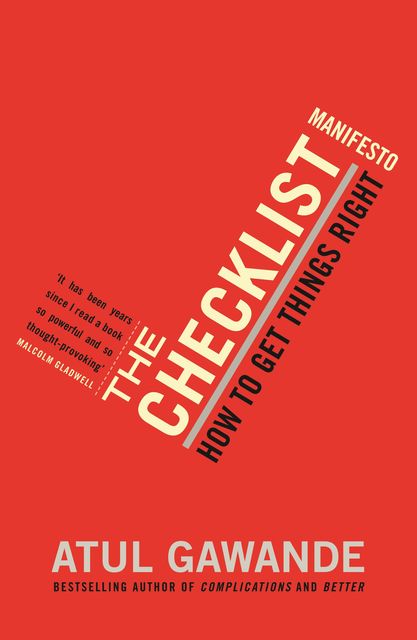The Checklist Manifesto
Bu kitap şu anda mevcut değil
217 yazdırılmış sayfalar
İzlenimler
- Nadir Abdullayevbir izlenim paylaşıldı7 yıl önce👍Okumaya değer
Alıntılar
- allsafealıntı yaptı5 yıl önceMedicine, with its dazzling successes but also frequent failures, therefore poses a significant challenge: What do you do when expertise is not enough? What do you do when even the super-specialists fail? We’ve begun to see an answer, but it has come from an unexpected source—one that has nothing to do with medicine at all.
- allsafealıntı yaptı5 yıl önceThose who survive line infections spend on average a week longer in intensive care. And this is just one of many risks. After ten days with a urinary catheter, 4 percent of American ICU patients develop a bladder infection. After ten days on a ventilator, 6 percent develop bacterial pneumonia, resulting in death 40 to 45 percent of the time. All in all, about half of ICU patients end up experiencing a serious complication, and once that occurs the chances of survival drop sharply.
It was another week before DeFilippo recovered sufficiently from his infections to come off the ventilator and two months before he left the hospital. Weak and debilitated, he lost his limousine business and his home, and he had to move in with his sister. The tube draining bile still dangled from his abdomen; when he was stronger, I was going to have to do surgery to reconstruct the main bile duct from his liver. But he survived. Most people in his situation do not.
Here, then, is the fundamental puzzle of modern medical care: you have a desperately sick patient and in order to have a chance of saving him you have to get the knowledge right and then you have to make sure that the 178 daily tasks that follow are done correctly— - allsafealıntı yaptı5 yıl önceThere is complexity upon complexity. And even specialization has begun to seem inadequate. So what do you do?
The medical profession’s answer has been to go from specialization to superspecialization. I told DeFilippo’s ICU story, for instance, as if I were the one tending to him hour by hour. That, however, was actually an intensivist (as intensive care specialists like to be called). As a general surgeon, I like to think I can handle most clinical situations. But, as the intricacies involved in intensive care have grown, responsibility has increasingly shifted to super-specialists. In the past decade, training programs focusing on critical care have opened in most major American and European cities, and half of American ICUs now rely on superspecialists.
Expertise is the mantra of modern medicine. In the early twentieth century, you needed only a high school diploma and a one-year medical degree to practice medicine. By the century’s end, all doctors had to have a college degree, a four-year medical degree, and an additional three to seven years of residency training in an individual field of practice—pediatrics, surgery, neurology, or the like.
fb2epub
Dosyalarınızı sürükleyin ve bırakın
(bir kerede en fazla 5 tane)


